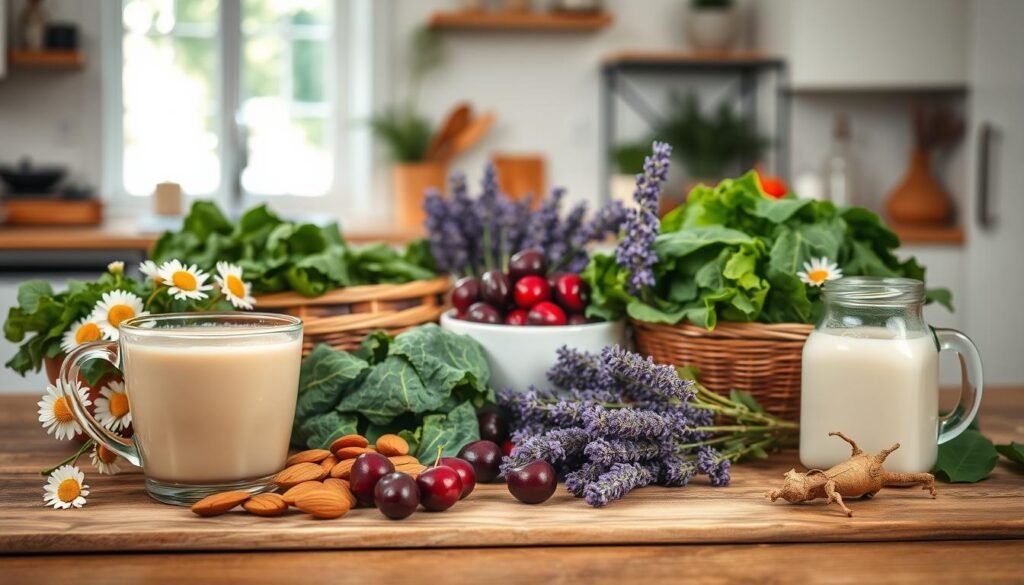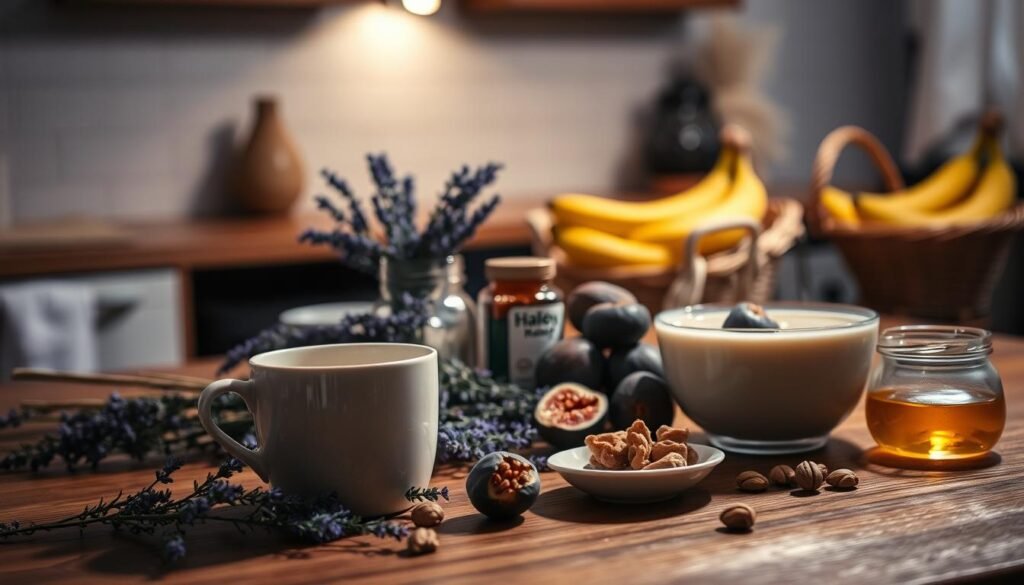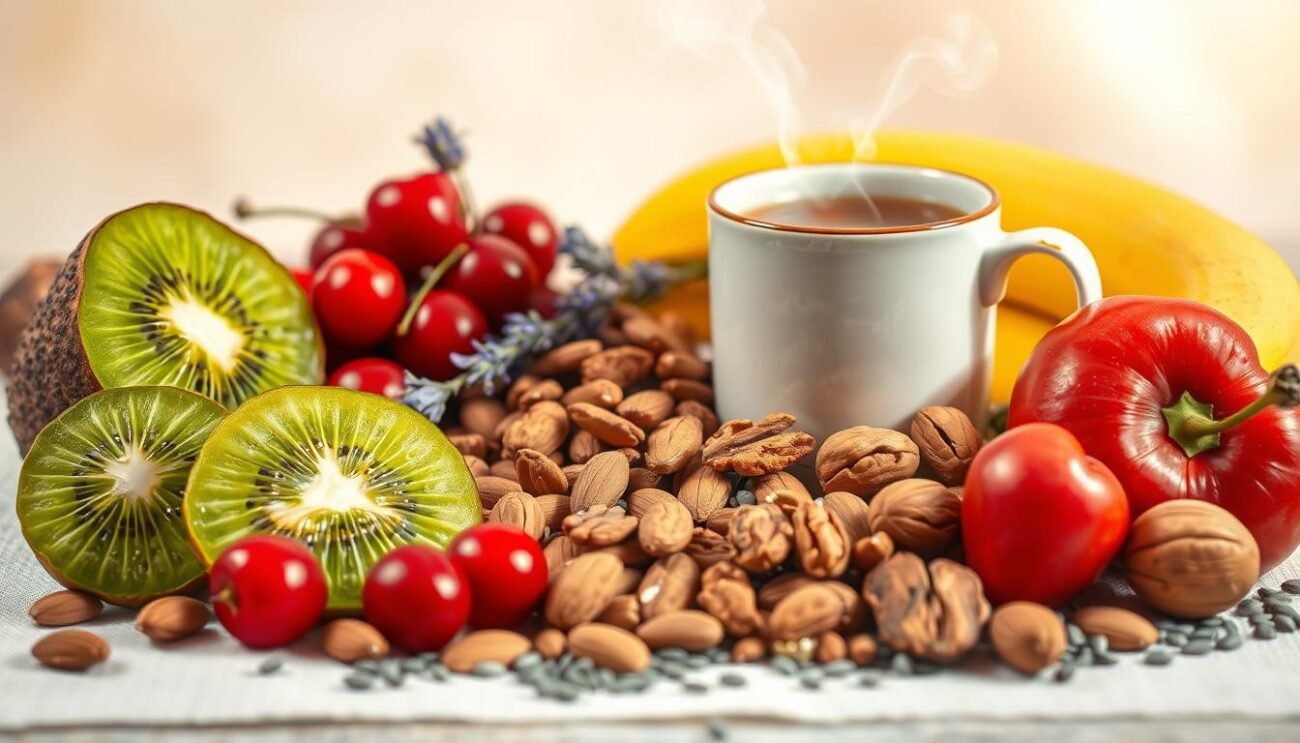A good night’s sleep is essential for overall health, and certain foods can significantly improve sleep quality. The relationship between diet and sleep is complex, but research has shown that specific nutrients can promote relaxation and help regulate sleep patterns.
Eating the right foods before bedtime can make a significant difference in how well you sleep. By incorporating sleep-inducing foods into your diet, you can enhance the quality of your rest.
Key Takeaways
- Including certain foods in your diet can improve sleep quality.
- Nutrients play a crucial role in regulating sleep patterns.
- A good night’s sleep is vital for overall health and well-being.
- Specific foods can promote relaxation before bedtime.
- Dietary changes can significantly impact sleep quality.
The Science Behind Food and Sleep
The connection between diet and sleep is complex, involving various nutrients and physiological processes. A well-balanced diet not only provides the body with the necessary nutrients but also plays a crucial role in regulating sleep patterns.
How Diet Affects Sleep Quality
Diet significantly influences sleep quality by providing the necessary building blocks for neurotransmitters and hormones that regulate the sleep-wake cycle. Nutrients like melatonin, serotonin, and magnesium are particularly important for sleep regulation.
- Melatonin is a hormone that directly controls the sleep-wake cycle.
- Serotonin is a neurotransmitter that helps regulate mood and sleep.
- Magnesium is a mineral that can help relax the body and promote better sleep.
Consuming foods rich in these nutrients can help improve sleep quality. For instance, foods that are high in tryptophan, an amino acid, can increase serotonin production, which in turn can improve sleep.
Key Nutrients That Promote Better Sleep
Certain nutrients are known to promote better sleep. These include:
- Melatonin: Found in tart cherries and cherry juice.
- Tryptophan: An amino acid found in turkey, chicken, and fish.
- Magnesium: Abundant in dark leafy greens, nuts, and seeds.
- Complex Carbohydrates: Help increase serotonin levels.
Incorporating these nutrients into one’s diet can be beneficial for improving sleep quality.
The Timing Factor: When to Eat for Better Sleep
The timing of meals also plays a significant role in sleep quality. Eating a large meal close to bedtime can disrupt sleep, while a light snack that includes sleep-promoting nutrients can be beneficial.
It’s recommended to finish eating at least 2-3 hours before bedtime to allow for proper digestion. A small, balanced snack that includes a mix of complex carbohydrates and protein can help promote a restful night’s sleep.
Top10 Best Foods for Better Sleep
Certain foods have been identified as sleep-promoting, helping individuals achieve restful nights. Incorporating these foods into your diet can be a natural way to improve sleep quality.
Tart Cherries and Cherry Juice
Tart cherries are a natural source of melatonin, a hormone that regulates sleep-wake cycles. Consuming tart cherry juice has been shown to improve sleep quality in some studies. The antioxidant properties of tart cherries also help reduce inflammation, which can indirectly affect sleep.
Kiwi Fruit
Kiwi is rich in antioxidants and serotonin, a neurotransmitter that helps regulate sleep. Research suggests that consuming kiwi before bed can improve sleep onset, duration, and quality. The high vitamin C content in kiwi also contributes to its overall health benefits.

Fatty Fish (Salmon, Tuna, Mackerel)
Fatty fish are an excellent source of vitamin B6 and omega-3 fatty acids, both of which are linked to improved sleep. Omega-3s help reduce inflammation and promote a healthy sleep-wake cycle. Including fatty fish in your evening meal can be a delicious way to enhance sleep quality.
Nuts (Almonds, Walnuts)
Nuts are a good source of melatonin and magnesium, a mineral that promotes relaxation and helps regulate sleep. Snacking on nuts like almonds and walnuts in the evening can be a healthy habit that supports better sleep. The combination of healthy fats and protein in nuts also helps keep you full until bedtime.
In addition to these foods, other sleep-promoting options include bananas, rice, and herbal teas. A balanced diet that includes a variety of these foods can help improve overall sleep quality.
How These Foods Improve Your Sleep Cycle
Certain foods have been found to significantly enhance sleep quality by influencing key sleep-regulating mechanisms. The consumption of these foods can lead to improved melatonin production, enhanced serotonin and tryptophan effects, and better blood sugar regulation, all of which are crucial for a restful night’s sleep.
Melatonin Production
Melatonin is a hormone that regulates the sleep-wake cycle. Foods rich in melatonin, such as tart cherries, can increase melatonin levels in the body, promoting better sleep. Research has shown that consuming tart cherry juice can significantly improve sleep quality in individuals with insomnia.
“The consumption of tart cherry juice has been shown to increase melatonin levels, thereby improving sleep quality.”
A study published in the Journal of Medicinal Food found that tart cherry juice improved sleep in older adults with insomnia. This makes tart cherries a valuable addition to a sleep-promoting diet.
Serotonin and Tryptophan Effects
Serotonin is a neurotransmitter that helps regulate sleep, among other functions. Tryptophan, an amino acid found in fatty fish and kiwi, is converted into serotonin in the brain, promoting relaxation and sleepiness. Consuming foods high in tryptophan can help improve sleep quality.
| Food | Tryptophan Content | Sleep Benefit |
|---|---|---|
| Salmon | High | Promotes relaxation and sleep |
| Kiwi | Moderate | Enhances serotonin production |
| Almonds | Low | Supports overall sleep quality |
Blood Sugar Regulation and Sleep
Blood sugar regulation plays a significant role in sleep quality. Consuming foods that help regulate blood sugar levels, such as almonds and other nuts, can prevent nighttime awakenings and improve overall sleep quality. A study found that eating almonds before bed can help regulate blood sugar levels during the night.
By incorporating these sleep-friendly foods into your diet, you can improve your sleep cycle and wake up feeling refreshed and rejuvenated.
Best Times to Consume Sleep-Inducing Foods
To reap the benefits of sleep-inducing foods, it’s essential to consider the optimal timing of consumption. Eating these foods at the right moment can enhance their sleep-promoting effects, leading to better sleep quality.
Optimal Timing Before Bed
Consuming sleep-inducing foods too close to bedtime can be beneficial, but the exact timing is crucial. Research suggests that eating a sleep-promoting snack or meal about 1-2 hours before bed can help regulate sleep patterns. For instance, having a glass of tart cherry juice or a small serving of nuts like almonds can promote melatonin production and relaxation.
Key Considerations for Timing:
- Eat a balanced dinner that includes sleep-promoting foods 2-3 hours before bedtime.
- Have a light snack containing sleep-inducing foods 1 hour before bed, if necessary.
- Avoid heavy meals close to bedtime as they can disrupt sleep.
As noted by sleep experts, “The timing of nutrient intake can influence sleep quality by affecting the body’s internal clock and sleep-regulating hormones.” (
This highlights the importance of not just what we eat, but when we eat it, in relation to sleep.
)
Creating a Pre-Sleep Routine with Food
Incorporating sleep-inducing foods into a pre-sleep routine can signal to the body that it’s time to sleep. This can be as simple as having a warm, non-caffeinated tea, like chamomile, or a small bowl of oatmeal with nuts. The key is to create a calming and predictable routine that includes these foods.
Sample Pre-Sleep Routine:
- Start winding down 30 minutes before bed with a relaxing activity, such as reading.
- Have a light snack that includes sleep-promoting foods.
- Dim the lights and maintain a cool bedroom temperature to enhance sleep quality.

By understanding the best times to consume sleep-inducing foods and incorporating them into a pre-sleep routine, individuals can potentially improve their sleep quality. It’s about creating a harmonious balance between diet and sleep hygiene practices.
Powerful Food Combinations for Deep Sleep
Some food combinations have a synergistic effect on promoting better sleep. By pairing certain foods, you can enhance their individual sleep-promoting properties, leading to a more restful night’s sleep.
Synergistic Food Pairings
Combining foods that complement each other in terms of their nutritional content can have a significant impact on sleep quality. For instance, pairing complex carbohydrates with tryptophan-rich foods can increase serotonin production, promoting relaxation.
Examples of synergistic pairings include:
- Oatmeal with almonds: The complex carbs in oatmeal help increase serotonin, while almonds provide magnesium for muscle relaxation.
- Banana with peanut butter: Bananas are rich in potassium, which can help relax muscles, while peanut butter contains tryptophan for increased serotonin production.
- Cherry juice with walnuts: Cherry juice is a natural source of melatonin, and walnuts are rich in serotonin and melatonin, enhancing the sleep-promoting effect.
Sample Evening Snack Ideas
Here are some evening snack ideas that combine sleep-promoting foods:
| Snack | Components | Sleep Benefit |
|---|---|---|
| Turkey and Avocado Toast | Whole grain toast, sliced turkey, avocado | Tryptophan from turkey, magnesium from avocado |
| Cherry-Almond Smoothie | Cherry juice, almond milk, almonds | Melatonin from cherry juice, magnesium from almonds |
| Banana-Oat Bites | Oats, mashed banana, almond butter | Serotonin from oats and banana, healthy fats from almond butter |
These snacks are not only delicious but also designed to promote a restful night’s sleep by combining foods that enhance each other’s sleep-promoting properties.
Foods to Avoid Before Bedtime
Certain foods can significantly disrupt sleep patterns if consumed before bedtime. Understanding which foods to avoid can greatly improve sleep quality.
Caffeine-Containing Foods
Caffeine is a well-known stimulant that can interfere with sleep. Foods and beverages containing caffeine, such as coffee, tea, chocolate, and some soft drinks, should be avoided in the hours leading up to bedtime.
High-Fat and Spicy Foods
High-fat foods can cause discomfort and indigestion, making it difficult to fall asleep. Similarly, spicy foods can lead to heartburn and acid reflux, further disrupting sleep. Examples include fried foods, rich sauces, and spicy dishes.
Hidden Sleep Disruptors in Your Diet
Beyond the obvious culprits, there are other dietary components that can affect sleep. These include high-sugar foods, which can cause a spike in blood sugar followed by a crash, potentially waking you up during the night.

To better understand the impact of these foods, let’s examine a comparison:
| Food Category | Examples | Impact on Sleep |
|---|---|---|
| Caffeine-Containing | Coffee, Tea, Chocolate | Stimulates the body, making it hard to fall asleep |
| High-Fat | Fried Foods, Rich Sauces | Causes discomfort and indigestion |
| Spicy | Spicy Dishes | Leads to heartburn and acid reflux |
| High-Sugar | Sweets, Sugary Drinks | Spikes blood sugar, potentially waking you up |
By being mindful of these foods and avoiding them before bedtime, you can take a significant step towards improving your sleep quality.
Simple Recipes Using Sleep-Friendly Foods
To improve sleep quality, it’s essential to explore simple recipes that feature sleep-promoting ingredients. Incorporating these foods into your diet can be a straightforward way to enhance your sleep. Here are some delicious and healthy ideas to get you started.
Bedtime Smoothies
Bedtime smoothies are an excellent way to consume sleep-friendly foods. A Cherry Almond Smoothie made with tart cherries, almonds, and a banana can promote melatonin production and relaxation. Another option is a Kiwi Banana Delight, combining kiwi fruit, banana, and a splash of almond milk for a serotonin boost.
Here’s a simple recipe for a sleep-promoting smoothie:
- 1 cup tart cherry juice
- 1/2 cup almond milk
- 1 tablespoon almond butter
- 1 banana
- A handful of ice cubes
Blend these ingredients until smooth and enjoy about 30 minutes before bedtime.
Sleep-Promoting Evening Snacks
Evening snacks can play a crucial role in preparing your body for sleep. Nutritious options like a small bowl of oatmeal with sliced banana or a handful of walnuts can help regulate blood sugar levels and promote a restful night’s sleep.
A simple snack idea is Walnuts and Figs:
- A handful of walnuts
- A few dried figs
This combination is not only delicious but also rich in melatonin and serotonin.
Light Dinner Ideas for Better Sleep
For a light dinner that promotes better sleep, consider dishes that include sleep-friendly foods. Grilled Salmon with Quinoa and Steamed Vegetables is an excellent option, as it combines the sleep-promoting effects of fatty fish with complex carbohydrates and fiber-rich vegetables.
Here’s a simple recipe:
- Grill a salmon fillet seasoned with herbs.
- Cook quinoa according to package instructions.
- Steam a variety of vegetables like broccoli, carrots, and green beans.
By incorporating these simple recipes into your daily routine, you can take a significant step towards improving your sleep quality. Experiment with different ingredients and find what works best for you.
Complementary Sleep Hygiene Practices
A well-rounded approach to better sleep involves not just the right foods, but also complementary sleep hygiene practices. While diet plays a significant role in promoting quality sleep, other habits and environmental factors can further enhance its benefits.
Creating the Ideal Sleep Environment
The environment in which you sleep can significantly impact the quality of your rest. Creating a sleep-conducive environment involves several key factors.
- Keep your bedroom cool, ideally between 60-67°F (15-19°C).
- Ensure your bedroom is dark, using blackout curtains if necessary.
- Invest in a comfortable mattress and pillows.
- Reduce noise levels using earplugs or a white noise machine if needed.
As Dr. Matthew Walker, a renowned sleep scientist, notes, “The bedroom should be a sanctuary for sleep, free from distractions and clutter.” This can be achieved by removing electronic devices and maintaining a clutter-free space.
| Sleep Environment Factor | Ideal Condition |
|---|---|
| Temperature | 60-67°F (15-19°C) |
| Light | Dark or dimly lit |
| Noise | Quiet or white noise |
Bedtime Rituals That Enhance Food Benefits
Establishing a consistent bedtime routine can signal to your body that it’s time to sleep, enhancing the benefits of sleep-promoting foods. Consider incorporating the following rituals into your pre-sleep routine:
- Practice relaxation techniques such as deep breathing or meditation.
- Engage in a calming activity like reading or listening to soothing music.
- Avoid screens for at least an hour before bedtime.
- Write in a journal to clear your mind.
“A pre-sleep routine helps transition your body from a state of wakefulness to sleepiness,” explains Sleep Specialist, Dr. Rachel Salas. “Combining these rituals with a sleep-friendly diet can significantly improve sleep quality.”

Exercise and Sleep Quality
Regular physical activity is known to improve sleep quality, but the timing of exercise is crucial. While exercise can help promote better sleep, vigorous activity too close to bedtime can have the opposite effect.
- Engage in regular physical activity, such as walking or jogging.
- Avoid vigorous exercise within 2-3 hours of bedtime.
- Consider gentle stretching or yoga in the evening to help relax.
As fitness expert, Jane Smith, suggests, “Finding the right balance between exercise and rest is key. Morning or afternoon exercise can help regulate your sleep-wake cycle.”
Conclusion
A well-balanced diet plays a crucial role in achieving better sleep. Incorporating the top10 best foods for better sleep into your daily meals can significantly improve sleep quality. Foods to help you sleep better are rich in nutrients that promote relaxation and regulate sleep patterns.
By understanding the science behind food and sleep, you can make informed choices about your diet. Consuming sleep-promoting foods at the right time and avoiding sleep disruptors can enhance the quality of your sleep. Creating a pre-sleep routine that includes these foods can also contribute to a restful night’s sleep.
Incorporating the right foods into your diet, along with complementary sleep hygiene practices, can lead to improved sleep quality. By making these simple changes, you can wake up feeling refreshed and rejuvenated, ready to take on the day.

